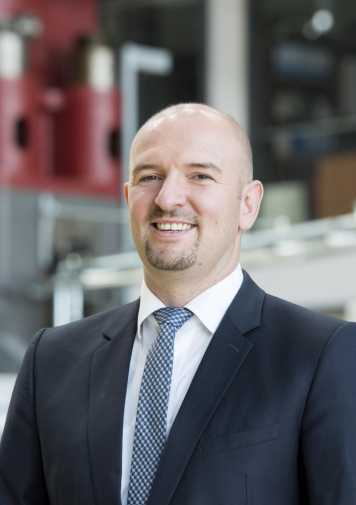Versatile manufacturing
Markus Bambach has been appointed Professor of New Manufacturing Technologies at the Department of Mechanical and Process Engineering. From 1 February 2020, the 43-year-old German will strengthen research in the areas materials, manufacturing and production technologies. We introduce him.

What is the main objective of your research?
Markus Bambach: Practically all the products we use in everyday life and our entire infrastructure are the result of manufacturing processes and principles. Manufacturing technology is an essential basis for the functioning of modern society.
With today's manufacturing technologies it is possible to either manufacture products in mass production at the lowest possible unit cost or premium products in small quantities – but not both in one. A major goal of my research is to develop technologies which make the unit costs as independent as possible of the quantity demanded, the variants to be manufactured or the component functions to be integrated. This goal can be described as "scale invariant manufacturing".
Particularly in order to maintain digital production technologies in high-wage locations such as Switzerland, it is becoming increasingly important to react quickly to the market and to let customers participate in the configuration of their products. To this end, solutions must be developed to produce components with the same properties using different production chains – for mass production and individualized manufacturing.
Another goal of my work is to develop manufacturing technologies that allow the properties to be precisely controlled on the component at any point. This helps with the third important goal of my research, the development of sustainable manufacturing technologies. After all, with increasing control over properties, the production of faulty parts and industrial waste can be avoided.
What fascinates you about this topic? What are the biggest challenges?
What fascinates me about manufacturing technology is its versatility. In addition to material science issues, where we are researching how processes affect materials, we have to take on the challenge of digitization, that is the introduction of information and communication technologies into production, as well as biologization, the imitation of biological (cycle) processes. In addition, we must develop the corresponding production machines.
Why did you decide to take up the position at D-MAVT?
I was faced with the choice of either managing research or doing my own research in the future. I decided to pursue research. The chance to work in one of the most innovative places in the world made my decision easy.
How do you maintain a balance between teaching and research? And what do you particularly like?
I think that good teaching requires one's own research in the field. At ETH Zurich in particular, a lecture should aim to convey the current issues of a discipline well beyond textbook knowledge. I particularly like to show students where they can make a contribution in my field of research in the future.
What do you recommend to students who want to pursue a career as a researcher? Which personal qualities do you need?
Above all, one should enjoy getting to the bottom of things. In general, curiosity, perseverance and patience are essential in research. In engineering, I would also say that a certain communication talent is helpful. Most of the current problems cannot be solved alone, but in interdisciplinary teams.
What do you do to balance your work and gain new energy?
I have two daughters, aged seven and three, and try to spend as much time as possible with my family. I also do sports, especially basketball. Switzerland will certainly bring us many new opportunities that we are looking forward to.
Short profile
- 2015 Professor for design and manufacturing at BTU Cottbus-Senftenberg, Germany
- 2014 Habilitation at RWTH Aachen University, Germany
- 2008-2015 Academic Council/Oberrat at RWTH Aachen University, Germany
- 2008 Doctor of Engineering Sciences at RWTH Aachen University, Germany
- 2002 Graduate Engineer/Material Science at the University of Saarland, Germany